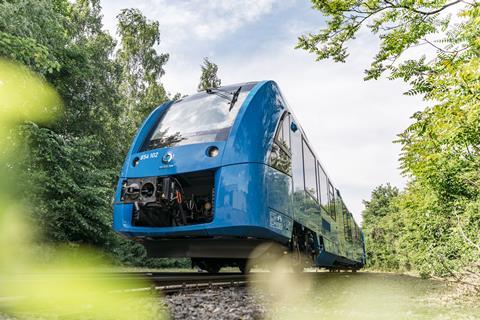
GERMANY: Rhein-Main-transport authority RMV has awarded DB Regio subsidiary Regionalverkehre Start Deutschland the contract to operate hydrogen fuel cell trains on the Taunus network for 12 years from December 11 2022.
Awarded following an international tender, the contract covers four services in the Frankfurt area:
- RB11: Bad Soden – Sulzbach – Frankfurt-Höchst (– Kelkheim);
- RB12: Königstein – Kelkheim –Frankfurt-Höchst – Frankfurt Hbf;
- RB15: Brandoberndorf – Usingen (– Friedrichsdorf - Bad Homburg – Frankfurt Hauptbahnhof);
- RB16: Friedberg – Friedrichsdorf – Bad Homburg.
The network is to be operated using a fleet of 27 Alstom iLint hydrogen fuel cell multiple-units. These were ordered by RMV’s rolling stock leasing subsidiary Fahma in May 2019 in a €500m deal which includes 25 years of maintenance and the supply of hydrogen. They will have 160 seats, real-time passenger information systems, free wi-fi and spaces for bicycles, wheelchairs and prams.
The timetable will be largely unchanged until electrification between Friedrichsdorf and Usingen has been completed. This will enable the extension of service S5, at which point service RB15 will be cut back to run only between Usingen and Brandoberndorf, apart from peak services running through to Frankfurt. RB16 will then change to a clockface timetable and be extended to Bad Homburg. Additional trains are also expected to operate on route RB12 at peak times.
‘With the start of the new contract, the world’s largest fleet of locally emission-free hydrogen trains will be operating through Hessen’, said RMV Managing Director Prof. Knut Ringat on March 8. ‘Our goal is to extend the environmental advantage of buses and trains and to offer locally emission-free mobility. Our passengers will also benefit from the new generation of vehicles. The hydrogen trains offer more seats than the trains previously used, are quieter and have free wi-fi.’
The services are currently operated by Hessische Landesbahn, and traincrew will be able to transfer to the new operator on their existing terms.
Describing the loss of the contract as an emotional moment, HLB Managing Director Veit Salzmann said the tender had been unusual. The rolling stock supply and maintenance and fuel had been procured separately, leaving the potential operators to complete only on the cost of staffing, operations, scheduling and quality assurance. He said the incumbent had calculated its offer with great care, to ensure a high quality of service, but it turned out that HLB had not submitted the lowest bid.

















